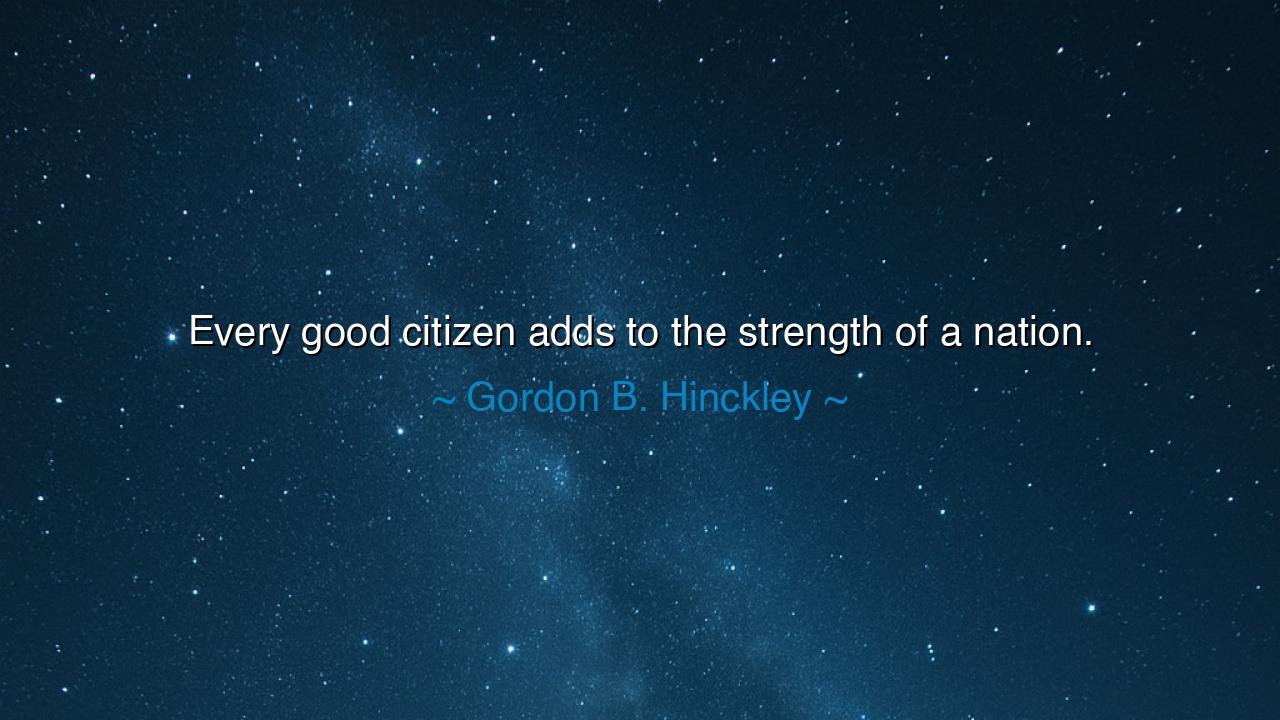
Every good citizen adds to the strength of a nation.






The words of Gordon B. Hinckley — “Every good citizen adds to the strength of a nation.” — resound with the clarity of eternal truth. They are not the boast of generals nor the rhetoric of rulers, but the gentle yet firm reminder that the destiny of a people rests not on kings and presidents alone, but on the daily deeds of its citizens. A nation is not merely its borders, its armies, or its wealth; it is a living body, and each person is a vital cell within it. When each citizen is good — honest, diligent, just, compassionate — the nation itself rises in glory and endurance.
In this saying, Hinckley elevates the role of the individual. Too often men and women imagine their actions are too small to matter, that their kindness or integrity is but a drop in the ocean. Yet the ancients knew the truth: an ocean is made of countless drops, and each one gives it life. The strength of a nation is not only measured in stone monuments or gilded halls of power, but in the unseen integrity of its people — the parent raising a child with virtue, the worker laboring with honesty, the neighbor showing kindness. These, though unnoticed by history’s scribes, are the pillars that hold up civilizations.
History itself testifies to this. Consider the Roman Republic in its earliest days, when its strength did not yet lie in conquest but in the discipline of its citizens. Farmers who worked their fields by day would take up arms to defend the republic by night. They were not mighty by wealth or birth, but by devotion to their community. It was their simple virtues — loyalty, frugality, courage — that built Rome’s foundations. When later generations forsook these virtues in pursuit of luxury and corruption, Rome’s might crumbled. Thus, the greatness of a nation stands or falls upon the character of its people.
We also see this lesson in the life of Mahatma Gandhi and the struggle for India’s independence. Gandhi did not begin by commanding armies or commanding palaces; he began by calling ordinary people to live as good citizens — to embrace nonviolence, to speak truth, to endure suffering with dignity. Millions of small acts of goodness — spinning cloth, refusing unjust laws, marching in peaceful unity — together created a power that toppled one of the greatest empires of the age. The strength of the nation was built not by force, but by the conscience of its people.
The lesson is that no one is insignificant. To be a good citizen is not only to obey laws, but to embody justice, to serve others, to protect the weak, to honor truth. Each of these actions adds weight to the foundation of society. Just as a single stone strengthens the wall of a fortress, so too does each act of goodness strengthen the nation’s walls against decay and collapse. The treachery of one corrupt citizen weakens the whole, but the virtue of one faithful citizen fortifies it.
Practical wisdom follows. Ask yourself: What can I do today to strengthen my nation? Perhaps it is teaching your children honesty. Perhaps it is serving your community quietly and faithfully. Perhaps it is standing against injustice, even when the crowd is silent. Do not despise small things, for the strength of a people is built in the unseen labors of the many. Be diligent, be kind, be courageous — and you will have added a stone to the fortress of your country.
Thus Hinckley’s words endure as a beacon: “Every good citizen adds to the strength of a nation.” Let them echo in your heart. Do not wait for kings or leaders to carry the burden of greatness; carry it yourself in your daily life. For when each citizen becomes a pillar of truth and honor, the nation itself becomes unshakable, able to withstand the storms of time. Be that citizen, and you will build not only your nation, but a legacy for generations yet unborn.






AAdministratorAdministrator
Welcome, honored guests. Please leave a comment, we will respond soon